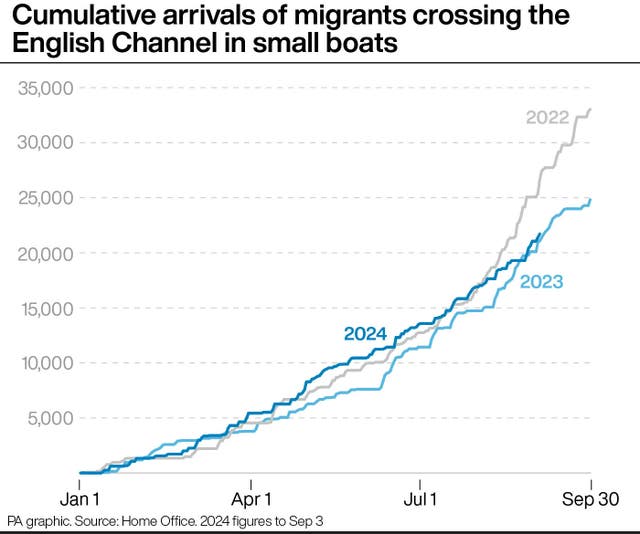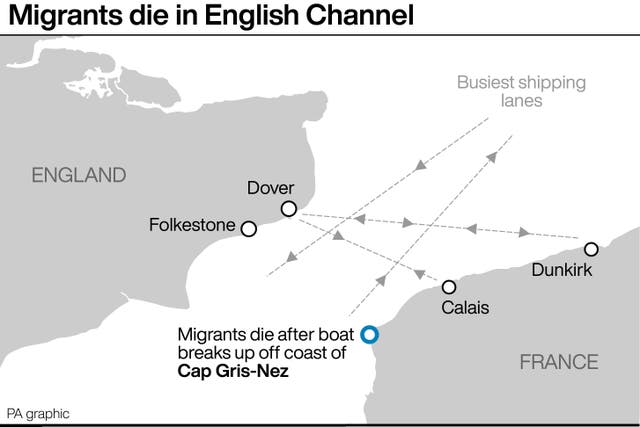Crossings continue day after 12 migrants die in Channel tragedy
A pregnant woman and six children were among those who lost their lives when their boat was ‘ripped apart’ at sea on Tuesday.

More migrants embarked on the perilous Channel crossing a day after 12 people died attempting the journey but 300 made it to UK shores.
A pregnant woman and six children were among those who lost their lives in what is being described as the deadliest Channel crossings tragedy of the year so far when their boat was “ripped apart” and sank off the northern French coast of Cap Gris-Nez on Tuesday.
At the same time, a Calais charity told how around 200 migrants were spotted trying to embark on the crossing from the French coast earlier that morning – but were stopped by police.
Home Office figures show 317 migrants made the journey in five boats on Tuesday, suggesting an average of around 63 people per boat.
This takes the provisional total number of migrants who have arrived in the UK so far this year after crossing the Channel to 21,720 – 3% higher than this time last year (21,086) but 19% lower than at the same point in 2022 (26,692), PA news agency analysis of government data shows.

Up to 65 people were rescued in Tuesday’s incident, which the Prime Minister branded “shocking and deeply tragic”, telling MPs in the Commons: “We must have a renewed determination to end this.”
His comments came after Home Secretary Yvette Cooper said “vital” efforts to dismantle “dangerous and criminal smuggler gangs” and to boost border security “must proceed apace”.
French interior minister Gerald Darmanin reportedly called for a UK-EU migration treaty to curb crossings in the wake of the tragedy.
But Downing Street rejected this, with a spokesman saying: “We have no plans to be part of an EU scheme on asylum, but we will continue to work with European partners to shut down smuggling routes and smash those criminal gangs.”
A vigil to remember those who died is due to take place in Calais on Wednesday evening.
More than 30 people have now died in Channel crossings so far this year, compared to 12 who are thought to have died or were recorded as missing in 2023, according to the French coastguard.

Earlier on Wednesday, reporters on a beach in Wimereux – near the site of Tuesday’s incident – described how a large group of migrants were crammed into a small dinghy, many with their legs dangling over the sides.
The boat, filmed by media for more than an hour as it slowly made its journey out to sea as passers-by walking dogs strolled on the beach, is said to have been approached by a patrol boat flying a French flag with a crew member seen tossing more life jackets to the migrants.
Meanwhile, a larger French patrol boat shadowed the dinghy from a distance.
Fishermen who recovered some of the dead on Tuesday said they were moved to tears seeing the bodies of two young women.
Axel Baheu, a crew member of Murex, one of two fishing boats that assisted the French rescue effort, said the body of one young woman – he guessed she was between 15 and 20 – had a telephone in a waterproof pouch around her neck.
It started to ring as he was pulling her out of the water and checking for a pulse, he said.
“That was hard because you know full well that no-one will ever answer,” Mr Baheu said.
“Even this morning we saw more than 200 people trying to cross and have been stopped (by police).
“We see it every month… every death at the border, the people don’t stop crossing.”
She said a lot of police were at the shoreline, with officers intervening overnight and in the morning.
Last week was “really busy” for crossings and there had been a “huge increase” in the number of people dying in the Channel this summer, Ms Vettorello said, adding: “We know a lot of people who were stopped to cross and were back to shore during those seven days.
“We received calls from people in distress in boats in the Channel, we received for example eight calls from eight different boats on Friday.”
The living conditions at the French shore are “really awful” she said, adding: “They just want to be in England.”
Claiming the deaths are “kind of expected because of the politics” amid “repression and securitisation of the coast”, she called for safe passage for migrants trying to reach the UK, adding: “If the politics changes here this could stop.”





